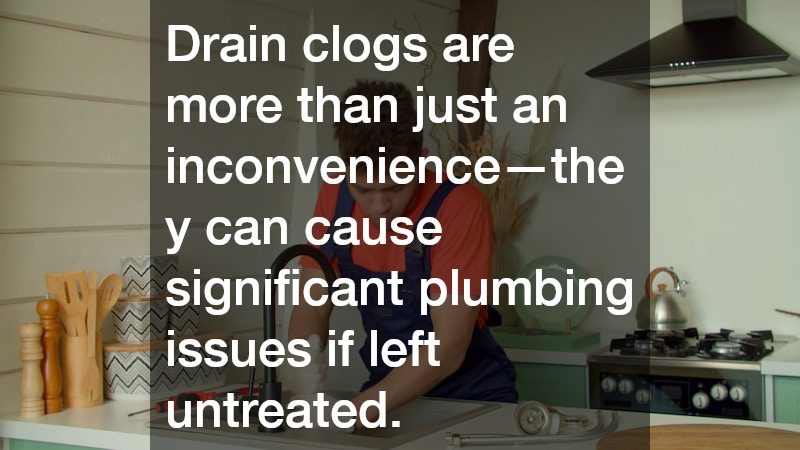Top Causes of Drain Clogs and How to Avoid Them
Drain clogs are one of the most common and frustrating plumbing issues that homeowners face. They often start as minor inconveniences, such as slow water drainage, but can quickly develop into major blockages if left unaddressed. Understanding the main causes of drain clogs and how to prevent them is essential for maintaining a healthy plumbing system. By practicing preventative measures and scheduling regular maintenance, you can keep your drains clear, avoid costly repairs, and extend the life of your plumbing.
What Are the Most Common Causes of Drain Clogs?
Several everyday habits contribute to clogged drains, and many of them can be prevented with simple changes. Hair and soap scum, for instance, are a leading cause of clogged bathroom drains.
Hair naturally falls during showers, and when it combines with soap residue, it forms sticky clumps that block water flow. Over time, this buildup hardens and becomes difficult to remove without proper tools.
Another frequent culprit is grease and oil accumulation, particularly in kitchen sinks. While it might seem harmless to pour cooking grease or oils down the drain, they cool and solidify inside pipes, creating a sticky coating that traps food particles. This combination quickly leads to stubborn clogs that require professional attention. Foreign objects and non-flushable items also play a role. Paper towels, wipes, cotton balls, and other hygiene products should never be flushed or washed down drains. These items do not break down like toilet paper and can block pipes entirely, often requiring extensive repairs to resolve.
How Can I Prevent Kitchen Sink Clogs?
The kitchen sink is one of the most heavily used drains in any home, making it more vulnerable to clogs. Preventing these issues starts with mindful daily practices. Proper disposal of food waste is essential, and scraping plates into the trash or compost before rinsing them in the sink can go a long way. Even small food scraps can build up over time and contribute to clogs.
Another helpful step is cleaning the pipes regularly with natural solutions. A mixture of hot water, baking soda, and vinegar can be poured down the drain once a week to dissolve minor buildup and keep things flowing smoothly. Homeowners can also rely on sink strainers to catch food particles and debris before they enter the pipes. Cleaning the strainer regularly ensures it remains effective and reduces the risk of clogs. These simple practices make a significant difference in keeping a kitchen sink in proper working condition.
What Are the Best Methods for Bathroom Drain Cleaning?
Bathroom drains face a unique set of challenges due to the frequent presence of hair, soap, and hygiene products. The most reliable way to keep these drains clear is through professional drain cleaning services. Trained plumbers use specialized equipment such as drain snakes and hydro-jetting tools to clear stubborn blockages without damaging your plumbing.
At the same time, simple home remedies can be useful between professional visits. Pouring boiling water down the drain or using a baking soda and vinegar mix can loosen minor clogs and prevent buildup from getting worse. Regular maintenance, such as checking drain covers for collected debris and ensuring that hair is removed before it enters the pipes, also helps reduce the frequency of clogs. Combining professional care with everyday maintenance is the best strategy for long-term bathroom plumbing health.
Can Tree Roots Affect My Plumbing?
Tree roots are an often-overlooked cause of drain and sewer line clogs, but they can create severe and costly problems. Roots naturally grow toward sources of water and nutrients, and small cracks in underground pipes provide the perfect entry point. Once inside, the roots expand and block water flow, which can lead to significant damage over time. Signs of tree root intrusion include frequent clogs, gurgling noises in the toilet, and slow drains throughout the home. In more serious cases, sewage backups and unpleasant odors may occur, making it clear that immediate professional attention is necessary.
The best way to handle this issue is through preventative care. Regular inspections using plumbing cameras can detect root growth before it becomes a major problem. In some cases, root barriers can be installed to protect pipes, while older or cracked pipes can be replaced with stronger materials to prevent future intrusion. By addressing tree root issues early, homeowners can save themselves from extensive and costly repairs.
Why Is Regular Drain Cleaning Important?
Many homeowners wait until a clog occurs before addressing their plumbing system, but regular maintenance is far more effective and affordable. Preventing expensive repairs is one of the biggest benefits of consistent drain cleaning. Small clogs may seem insignificant, but if ignored, they can escalate into major blockages or even pipe damage, requiring costly repairs or replacements. Regular cleaning also helps maintain efficient water flow, which means sinks, tubs, and toilets function as they should without slow drainage or backups.
Another key advantage is that routine drain cleaning enhances the lifespan of your plumbing. By removing buildup, blockages, and potential hazards before they become serious, you reduce wear and tear on pipes, ultimately extending their longevity. Investing in preventative maintenance saves time, money, and frustration in the long run.
Drain clogs are more than just an inconvenience—they can cause significant plumbing issues if left untreated. By understanding the top causes of clogs and taking steps to prevent them, homeowners can maintain a healthy plumbing system and avoid expensive repairs. Whether it is being careful about what goes down the drain, scheduling professional services, or addressing outdoor risks like tree roots, preventative care makes a major difference. Regular drain cleaning is a smart, cost-effective way to protect your home, ensure efficient water flow, and extend the life of your plumbing for years to come.



